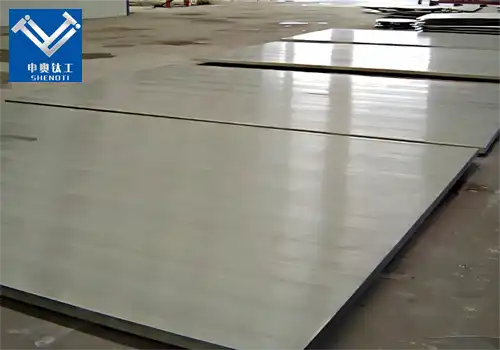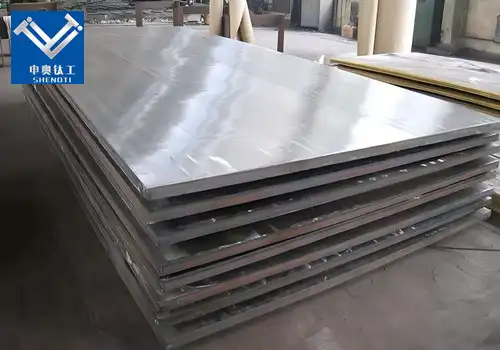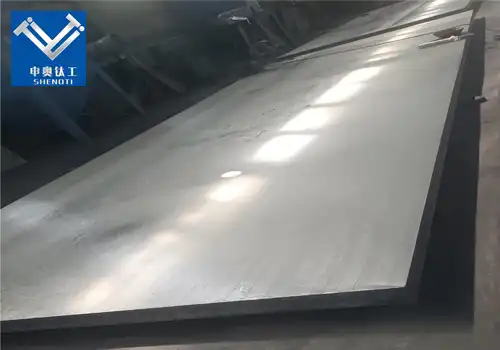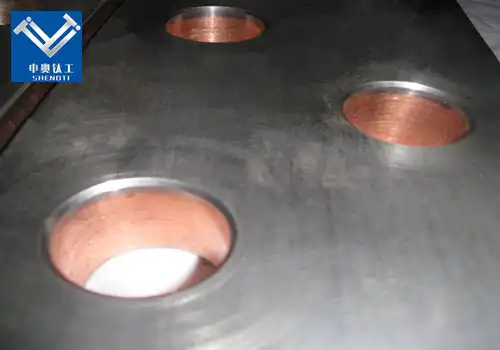
What Industries Are Titanium Copper Composite Plates Mainly Used In?
2025-04-24 09:29:50
What Industries Are Titanium Copper Composite Plates Mainly Used In?
Titanium copper composite plates, also known as titanium clad plates, are engineered materials that combine the exceptional corrosion resistance of titanium with the superior electrical and thermal conductivity of copper. This unique combination makes them invaluable in various industries where both properties are essential.
What Are the Advantages of Titanium Clad Plates?
1. Exceptional Corrosion Resistance
Titanium is renowned for its outstanding resistance to corrosion, especially in aggressive environments containing acids, alkalis, and chlorides. When bonded with copper, the resulting composite plate inherits this resistance, making it ideal for applications where corrosion is a significant concern.
2. Superior Electrical and Thermal Conductivity
Copper is well-known for its excellent electrical and thermal conductivity. By combining it with titanium, the composite plate maintains high conductivity levels, which is crucial in industries like electronics and power generation.
3. High Strength-to-Weight Ratio
Titanium offers a high strength-to-weight ratio, which, when combined with copper, results in a composite material that is both strong and lightweight. This property is particularly beneficial in aerospace and automotive applications where weight reduction is critical.
4. Cost-Effectiveness
Using a titanium copper composite plate allows industries to leverage the benefits of both metals while reducing overall material costs. Pure titanium is expensive, but by bonding it with copper, manufacturers can achieve desired properties at a lower cost.
5. Versatility in Applications
The unique combination of properties in titanium copper composite plates makes them suitable for a wide range of applications across various industries, including petrochemical, power generation, marine engineering, and electronics.
How Are Titanium Clad Plates Manufactured?
The manufacturing of titanium copper composite plates involves several sophisticated processes to ensure a strong and durable bond between the two metals. The primary methods include:
1. Explosive Bonding
This method uses controlled explosive energy to bond titanium and copper plates together. The explosive force causes the metals to collide at high velocity, creating a metallurgical bond without melting the materials. Explosive bonding is known for producing high-quality bonds with excellent mechanical properties.
2. Hot Rolling
In hot rolling, titanium and copper plates are heated and passed through rollers to bond them together. This process not only bonds the metals but also reduces the thickness of the composite plate to the desired dimensions. Hot rolling is suitable for producing large quantities of composite plates with uniform properties.
3. Cold Rolling
Cold rolling involves passing the titanium and copper plates through rollers at room temperature. This method increases the strength and hardness of the composite plate through strain hardening. Cold rolling is often used after hot rolling to achieve precise thickness and surface finish.
4. Diffusion Bonding
Diffusion bonding is a solid-state welding process where titanium and copper plates are pressed together at high temperatures for an extended period. This allows atoms from both metals to diffuse across the interface, creating a strong bond. Diffusion bonding is ideal for applications requiring high precision and strength.
What Is the Cost of Titanium Clad Plates?
The cost of titanium copper composite plates varies based on several factors:
1. Material Costs
The prices of titanium and copper fluctuate based on market demand and supply. Titanium is generally more expensive than copper, so the overall cost of the composite plate depends on the proportion of each metal used.
2. Manufacturing Process
Different manufacturing methods have varying costs. For instance, explosive bonding requires specialized equipment and safety measures, making it more expensive than hot or cold rolling.
3. Plate Dimensions and Thickness
Larger and thicker plates require more material and processing time, increasing the overall cost. Custom dimensions may also add to the expense due to the need for specialized tooling.
4. Quality Standards and Certifications
Composite plates that meet stringent industry standards and certifications may cost more due to the additional testing and quality assurance processes involved.
5. Order Volume
Bulk orders often benefit from economies of scale, reducing the cost per unit. Conversely, small orders may have higher per-unit costs due to setup and processing expenses.
Applications of Titanium Copper Composite Plates in Various Industries
1. Petrochemical Industry
In the petrochemical sector, equipment is often exposed to harsh chemicals and high temperatures. Titanium copper composite plates are used in heat exchangers, reactors, and piping systems due to their corrosion resistance and thermal conductivity.
2. Power Generation
Power plants, especially those utilizing nuclear or geothermal energy, require materials that can withstand extreme conditions. Titanium copper composite plates are employed in condensers, heat exchangers, and other components where both corrosion resistance and thermal conductivity are essential.
3. Marine Engineering
Marine environments are highly corrosive due to saltwater exposure. Titanium copper composite plates are used in shipbuilding, offshore platforms, and desalination plants to ensure longevity and reliability of structures and equipment.
4. Electronics and Electrical Engineering
The electronics industry benefits from the high electrical conductivity of copper and the corrosion resistance of titanium. Composite plates are used in connectors, circuit boards, and other components where these properties are crucial.
5. Automotive Industry
In automotive applications, especially in electric vehicles, components require materials that are lightweight, conductive, and resistant to corrosion. Titanium copper composite plates are used in battery systems, connectors, and thermal management components.
6. Aerospace Industry
The aerospace sector demands materials that offer high strength-to-weight ratios and can withstand extreme temperatures and corrosive environments. Titanium copper composite plates are utilized in structural components, heat exchangers, and other critical parts.
7. Chemical Processing
Chemical plants often handle corrosive substances that can degrade standard materials. Titanium copper composite plates are used in reactors, piping, and storage tanks to ensure durability and safety.
8. Desalination Plants
Desalination processes involve exposure to saltwater and high temperatures. The corrosion resistance and thermal conductivity of titanium copper composite plates make them ideal for use in evaporators and heat exchangers in desalination facilities.
9. Salt Production
In salt production, equipment is exposed to brine and other corrosive substances. Titanium copper composite plates are used in evaporators and other processing equipment to enhance longevity and reduce maintenance costs.
10. Metallurgical Industry
The metallurgical industry uses titanium copper composite plates in processes involving high temperatures and corrosive environments, such as in the production of non-ferrous metals and alloys.
Titanium copper composite plates are versatile materials that combine the best properties of titanium and copper. Their unique combination of corrosion resistance, conductivity, strength, and cost-effectiveness makes them suitable for a wide range of industries, including petrochemical, power generation, marine engineering, electronics, and medical equipment.
Advancements in manufacturing processes like explosive bonding, roll bonding, and hot pressing have made it possible to produce high-quality titanium copper composite plates tailored to specific application requirements.
As industries continue to seek materials that offer performance, durability, and cost savings, titanium copper composite plates are poised to play an increasingly important role in modern engineering applications.
Contact Us
For more information on titanium copper composite plates and how they can benefit your industry, please contact us:
Email: zh@baojiti.com.cn
Our team of experts is ready to assist you with your material needs and provide solutions tailored to your specific applications.















